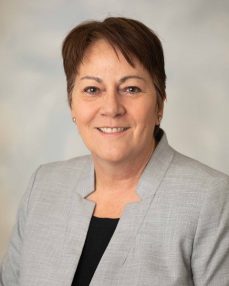Welcome to Texas Geosciences, from Dean Claudia Mora
April 22, 2021

Friends and Colleagues,
I am pleased to present the spring edition of Texas Geosciences. It’s been another challenging semester for students, researchers and faculty. Already dealing with the COVID-19 pandemic, people in Austin and other Texas communities faced “SnoVID”, a massive winter storm that left many millions without power and water for days, and that raises red flags about our resilience to future extreme weather events. February’s winter storm was an important reminder of how the geosciences remain vital for solving the challenges facing society, whether it is the ability to better understand and predict extreme events or to provide sustainable and resilient energy systems. What has been resilient are the people at the Jackson School of Geosciences. We just got word that Professor Thorsten Becker is being honored with the Evgenii Burov Medal from the International Lithosphere Programs for his outstanding contributions to Geodynamics. And research and education continue here at a strong pace. I am delighted to share some of our stories.
This issue has some great examples of research that showcases how geosciences benefit society and how Jackson School scientists are ready and eager to work across disciplines to develop creative solutions for society’s challenges. TexNet, the state’s seismic monitoring network managed by our Bureau of Economic Geology, is growing and improving and now plays an important role in the national seismic network. Professor Dev Niyogi of our Department of Geological Sciences has shown that weather does not significantly affect the spread of COVID-19. And scientists at our Institute for Geophysics (UTIG) are delving deep under glaciers to understand how climate change may speed their thinning, while other UTIG researchers search for sand to help protect the Texas coast from storms and erosion.
These research stories illustrate the importance of educating geoscientists capable of collecting, analyzing and interpreting the complex and massive amounts of data needed to understand natural systems. Professor Sharon Mosher, whom many of you know from her decade as dean of the Jackson School, spearheaded a multi-year effort with the American Geosciences Institute to reshape undergraduate geosciences education across the nation, so that our students are better prepared to join the workforce of the future and to help resolve the challenges facing society. The effort was six years in the making and included contributions from more than 1,000 colleagues from geosciences education institutions and industries throughout the country—many of you reading this message likely participated! Our top story in this issue of Texas Geosciences reviews the final report, now published.
We are using the report to help guide our conversations and efforts around reforming the curriculum at the Jackson School. I would welcome the opportunity to discuss our efforts and hear how others are approaching the issues at their own institutions.
I hope you enjoy this issue of Texas Geosciences!
Claudia

